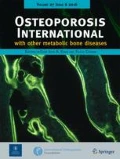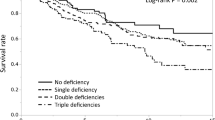Abstract
Summary
In a population-based study on cobalamin status and incident fractures in elderly men (n = 790) with an average follow-up of 5.9 years, we found that low levels of metabolically active and total cobalamins predict incident fractures, independently of body mass index (BMI), bone mineral density (BMD), plasma total homocysteine (tHcy), and cystatin C.
Introduction
Cobalamin deficiency in elderlies may affect bone metabolism. This study aims to determine whether serum cobalamins or holotranscobalamin (holoTC; the metabolic active cobalamin) predict incident fractures in old men.
Methods
Men participating in the Gothenburg part of the population-based Osteoporotic Fractures in Men (MrOS) Sweden cohort and without ongoing vitamin B medication were included in the present study (n = 790; age range, 70–81 years).
Results
During an average follow-up of 5.9 years, 110 men sustained X-ray-verified fractures including 45 men with clinical vertebral fractures. The risk of fracture (adjusted for age, smoking, BMI, BMD, falls, prevalent fracture, tHcy, cystatin C, 25-OH-vitamin D, intake of calcium, and physical activity (fully adjusted)), increased per each standard deviation decrease in cobalamins (hazard ratio (HR), 1.38; 95 % confidence intervals (CI), 1.11–1.72) and holoTC (HR, 1.26; 95 % CI, 1.03–1.54), respectively. Men in the lowest quartile of cobalamins and holoTC (fully adjusted) had an increased risk of all fracture (cobalamins, HR = 1.67 (95 % CI, 1.06–2.62); holoTC, HR = 1.74 (95 % CI, 1.12–2.69)) compared with quartiles 2–4. No associations between folate or tHcy and incident fractures were seen.
Conclusions
We present novel data showing that low levels of holoTC and cobalamins predicting incident fracture in elderly men. This association remained after adjustment for BMI, BMD, tHcy, and cystatin C. However, any causal relationship between low cobalamin status and fractures should be explored in a prospective treatment study.

Similar content being viewed by others
References
Loikas S, Koskinen P, Irjala K, Lopponen M, Isoaho R, Kivela SL, Pelliniemi TT (2007) Vitamin B12 deficiency in the aged: a population-based study. Age Ageing 36:177–183
Lewerin C, Jacobsson S, Lindstedt G, Nilsson-Ehle H (2008) Serum biomarkers for atrophic gastritis and antibodies against Helicobacter pylori in the elderly: implications for vitamin B12, folic acid and iron status and response to oral vitamin therapy. Scand J Gastroenterol 43:1050–1056
Carmel R, Lau KH, Baylink DJ, Saxena S, Singer FR (1988) Cobalamin and osteoblast-specific proteins. N Engl J Med 319:70–75
Espallargues M, Sampietro-Colom L, Estrada MD, Sola M, del Rio L, Setoain J, Granados A (2001) Identifying bone-mass-related risk factors for fracture to guide bone densitometry measurements: a systematic review of the literature. Osteoporos Int 12:811–822
Herrmann M, Peter Schmidt J, Umanskaya N, Wagner A, Taban-Shomal O, Widmann T, Colaianni G, Wildemann B, Herrmann W (2007) The role of hyperhomocysteinemia as well as folate, vitamin B(6) and B(12) deficiencies in osteoporosis: a systematic review. Clin Chem Lab Med 45:1621–1632
McLean RR, Jacques PF, Selhub J, Tucker KL, Samelson EJ, Broe KE, Hannan MT, Cupples LA, Kiel DP (2004) Homocysteine as a predictive factor for hip fracture in older persons. N Engl J Med 350:2042–2049
van Meurs JB, Dhonukshe-Rutten RA, Pluijm SM et al (2004) Homocysteine levels and the risk of osteoporotic fracture. N Engl J Med 350:2033–2041
Yazdanpanah N, Zillikens MC, Rivadeneira F, de Jong R, Lindemans J, Uitterlinden AG, Pols HA, van Meurs JB (2007) Effect of dietary B vitamins on BMD and risk of fracture in elderly men and women: the Rotterdam study. Bone 41:987–994
McLean RR, Jacques PF, Selhub J, Fredman L, Tucker KL, Samelson EJ, Kiel DP, Cupples LA, Hannan MT (2008) Plasma B vitamins, homocysteine, and their relation with bone loss and hip fracture in elderly men and women. J Clin Endocrinol Metab 93:2206–2212
van Wijngaarden JP, Dhonukshe-Rutten RA, van Schoor NM et al (2011) Rationale and design of the B-PROOF study, a randomized controlled trial on the effect of supplemental intake of vitamin B12 and folic acid on fracture incidence. BMC Geriatr 11:80
Sato Y, Honda Y, Iwamoto J, Kanoko T, Satoh K (2005) Effect of folate and mecobalamin on hip fractures in patients with stroke: a randomized controlled trial. JAMA 293:1082–1088
Sawka AM, Ray JG, Yi Q, Josse RG, Lonn E (2007) Randomized clinical trial of homocysteine level lowering therapy and fractures. Arch Intern Med 167:2136–2139
Carmel R (2011) Biomarkers of cobalamin (vitamin B-12) status in the epidemiologic setting: a critical overview of context, applications, and performance characteristics of cobalamin, methylmalonic acid, and holotranscobalamin II. Am J Clin Nutr 94:348S–358S
Lewerin C, Ljungman S, Nilsson-Ehle H (2007) Glomerular filtration rate as measured by serum cystatin C is an important determinant of plasma homocysteine and serum methylmalonic acid in the elderly. J Intern Med 261:65–73
Quadros EV (2010) Advances in the understanding of cobalamin assimilation and metabolism. Br J Haematol 148:195–204
Ulleland M, Eilertsen I, Quadros EV, Rothenberg SP, Fedosov SN, Sundrehagen E, Orning L (2002) Direct assay for cobalamin bound to transcobalamin (holo-transcobalamin) in serum. Clin Chem 48:526–532
Herrmann W, Obeid R, Schorr H, Geisel J (2003) Functional vitamin B12 deficiency and determination of holotranscobalamin in populations at risk. Clin Chem Lab Med 41:1478–1488
Mellstrom D, Johnell O, Ljunggren O, Eriksson AL, Lorentzon M, Mallmin H, Holmberg A, Redlund-Johnell I, Orwoll E, Ohlsson C (2006) Free testosterone is an independent predictor of BMD and prevalent fractures in elderly men: MrOS Sweden. J Bone Miner Res 21:529–535
Washburn RA, Smith KW, Jette AM, Janney CA (1993) The Physical Activity Scale for the Elderly (PASE): development and evaluation. J Clin Epidemiol 46:153–162
Ribom EL, Grundberg E, Mallmin H, Ohlsson C, Lorenzon M, Orwoll E, Holmberg AH, Mellstrom D, Ljunggren O, Karlsson MK (2009) Estimation of physical performance and measurements of habitual physical activity may capture men with high risk to fall—data from the Mr Os Sweden cohort. Arch Gerontol Geriatr 49:e72–e76
Mellstrom D, Vandenput L, Mallmin H et al (2008) Older men with low serum estradiol and high serum SHBG have an increased risk of fractures. J Bone Miner Res 23:1552–1560
Orning L, Rian A, Campbell A, Brady J, Fedosov SN, Bramlage B, Thompson K, Quadros EV (2006) Characterization of a monoclonal antibody with specificity for holo-transcobalamin. Nutr Metab Lond 3:3
Brady J, Wilson L, McGregor L, Valente E, Orning L (2008) Active B12: a rapid, automated assay for holotranscobalamin on the Abbott AxSYM analyzer. Clin Chem 54:567–573
Johansson H, Oden A, Lerner UH, et al. (2012) High serum adiponectin predicts incident fractures in elderly men. Mr OS Sweden. J Bone Miner Res 27:1390–1396
Kindblom JM, Ohlsson C, Ljunggren O, Karlsson MK, Tivesten A, Smith U, Mellstrom D (2009) Plasma osteocalcin is inversely related to fat mass and plasma glucose in elderly Swedish men. J Bone Miner Res 24:785–791
Harrell FE (ed) (2001) General aspects of fitting regression models: regression modeling strategies. Springer, New York
Lindenbaum J, Rosenberg IH, Wilson PW, Stabler SP, Allen RH (1994) Prevalence of cobalamin deficiency in the Framingham elderly population. Am J Clin Nutr 60:2–11
Lewerin C, Nilsson-Ehle H, Jacobsson S, Karlsson MK, Ohlsson C, Mellstrom D (2013) Holotranscobalamin is not influenced by decreased renal function in elderly men: the MrOS Sweden study. Ann Clin Biochem (in press)
Obeid R, Herrmann W (2007) Holotranscobalamin in laboratory diagnosis of cobalamin deficiency compared to total cobalamin and methylmalonic acid. Clin Chem Lab Med 45:1746–1750
Nilsson K, Gustafson L, Isaksson A, Hultberg B (2005) Plasma homocysteine and markers of bone metabolism in psychogeriatric patients. Scand J Clin Lab Invest 65:671–680
Dhonukshe-Rutten RA, Pluijm SM, de Groot LC, Lips P, Smit JH, van Staveren WA (2005) Homocysteine and vitamin B12 status relate to bone turnover markers, broadband ultrasound attenuation, and fractures in healthy elderly people. J Bone Miner Res 20:921–929
Herrmann M, Schmidt J, Umanskaya N, Colaianni G, Al Marrawi F, Widmann T, Zallone A, Wildemann B, Herrmann W (2007) Stimulation of osteoclast activity by low B-vitamin concentrations. Bone 41:584–591
Vaes BL, Lute C, Blom HJ, Bravenboer N, de Vries TJ, Everts V, Dhonukshe-Rutten RA, Muller M, de Groot LC, Steegenga WT (2009) Vitamin B(12) deficiency stimulates osteoclastogenesis via increased homocysteine and methylmalonic acid. Calcif Tissue Int 84:413–422
Herrmann M, Umanskaya N, Wildemann B, Colaianni G, Schmidt J, Widmann T, Zallone A, Herrmann W (2007) Accumulation of homocysteine by decreasing concentrations of folate, vitamin B12 and B6 does not influence the activity of human osteoblasts in vitro. Clin Chim Acta 384:129–134
Morris MS, Jacques PF, Selhub J (2005) Relation between homocysteine and B-vitamin status indicators and bone mineral density in older Americans. Bone 37:234–242
Tucker KL, Hannan MT, Qiao N, Jacques PF, Selhub J, Cupples LA, Kiel DP (2005) Low plasma vitamin B12 is associated with lower BMD: the Framingham Osteoporosis Study. J Bone Miner Res 20:152–158
Gjesdal CG, Vollset SE, Ueland PM, Refsum H, Drevon CA, Gjessing HK, Tell GS (2006) Plasma total homocysteine level and bone mineral density: the Hordaland Homocysteine Study. Arch Intern Med 166:88–94
Lewerin C, Matousek M, Steen G, Johansson B, Steen B, Nilsson-Ehle H (2005) Significant correlations of plasma homocysteine and serum methylmalonic acid with movement and cognitive performance in elderly subjects but no improvement from short-term vitamin therapy: a placebo-controlled randomized study. Am J Clin Nutr 81:1155–1162
Samieri C, Ginder Coupez V, Lorrain S, Letenneur L, Alles B, Feart C, Paineau D, Barberger-Gateau P (2013) Nutrient patterns and risk of fracture in older subjects: results from the Three-City Study. Osteoporos Int 24:1295–1305
Ensrud KE, Parimi N, Cauley JA, Ishani A, Slinin Y, Hillier TA, Taylor BC, Steffes M, Cummings SR (2013) Cystatin C and risk of hip fractures in older women. J Bone Miner Res (in press)
Leboff MS, Narweker R, LaCroix A et al (2009) Homocysteine levels and risk of hip fracture in postmenopausal women. J Clin Endocrinol Metab 94:1207–1213
LaCroix AZ, Lee JS, Wu L et al (2008) Cystatin-C, renal function, and incidence of hip fracture in postmenopausal women. J Am Geriatr Soc 56:1434–1441
Ensrud KE, Lui LY, Taylor BC, Ishani A, Shlipak MG, Stone KL, Cauley JA, Jamal SA, Antoniucci DM, Cummings SR (2007) Renal function and risk of hip and vertebral fractures in older women. Arch Intern Med 167:133–139
Fried LF, Biggs ML, Shlipak MG et al (2007) Association of kidney function with incident hip fracture in older adults. J Am Soc Nephrol 18:282–286
Acknowledgments
The research was supported by the Swedish Research Council, the Swedish Foundation for Strategic Research, and the ALF/LUA research grant in Gothenburg.
Conflicts of interest
None.
Author information
Authors and Affiliations
Corresponding author
Rights and permissions
About this article
Cite this article
Lewerin, C., Nilsson-Ehle, H., Jacobsson, S. et al. Low holotranscobalamin and cobalamins predict incident fractures in elderly men: the MrOS Sweden. Osteoporos Int 25, 131–140 (2014). https://doi.org/10.1007/s00198-013-2527-y
Received:
Accepted:
Published:
Issue Date:
DOI: https://doi.org/10.1007/s00198-013-2527-y




